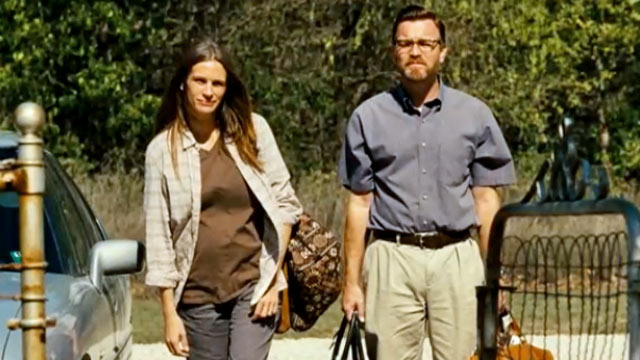 Not even the worst family gathering, something I’m sure everyone is going to be forced to suffer through at some point this holiday season, can compare to the boorish behavior of the characters in “August: Osage County.” Despite a world class cast, a 6-time Emmy nominated director at the helm (John Wells), and a Pulitzer Prize-winning playwright adapting her own material (Tracy Letts), this attempt at a complex household drama comes off as nothing more than sluggish melodrama.
Not even the worst family gathering, something I’m sure everyone is going to be forced to suffer through at some point this holiday season, can compare to the boorish behavior of the characters in “August: Osage County.” Despite a world class cast, a 6-time Emmy nominated director at the helm (John Wells), and a Pulitzer Prize-winning playwright adapting her own material (Tracy Letts), this attempt at a complex household drama comes off as nothing more than sluggish melodrama.
The Weston’s are one of those clans that don’t like to see each other unless they are forced to do so. That’s probably because the matriarch of the family Violet, played to prickly perfection by Meryl Streep, is about as ornery as they come. Bitter, depressed, and addicted to prescription medication, the woman doesn’t even let mouth cancer get in the way of her constantly lambasting her now fully grown children. As a result, her longtime husband Beverly (Sam Shepard) gives up one night and runs away.
Not without his flaws either, Beverly is a longtime drunk. Not knowing what trouble her husband has gotten into, Violet, as a last ditch effort, contacts her relatives in order to solve the crisis. One by one, the Weston family descends on Osage County, Oklahoma. As their numbers grow in size, they become a lot louder and angrier as well.
Beverly’s disappearance acts as a convenient scenario to set the stage for a ton, and I don’t use that word lightly, of bickering, cussing, and inter-family boohooing. But what’s the point? For almost two hours, the audience watches such A-list actors as the aforementioned Streep, in addition to Julia Roberts, Ewan McGregor, Chris Cooper, Abigail Breslin, Benedict Comberbatch, Margo Martindale, Dermot Mulroney and Juliette Lewis, yell at one another for petty reasons. Despite Golden Globe nominations going to both Streep and Roberts for their performances as mother and daughter, they are simply underused given the circumstances.
cussing, and inter-family boohooing. But what’s the point? For almost two hours, the audience watches such A-list actors as the aforementioned Streep, in addition to Julia Roberts, Ewan McGregor, Chris Cooper, Abigail Breslin, Benedict Comberbatch, Margo Martindale, Dermot Mulroney and Juliette Lewis, yell at one another for petty reasons. Despite Golden Globe nominations going to both Streep and Roberts for their performances as mother and daughter, they are simply underused given the circumstances.
With that being said, however, when Letts tones down her characters’ tempers, the dialogue simply sparkles. Much of the action in the movie is restricted to long bouts of discourse, it was taken from the stage after all, and Wells gives the audience the front row seat most could never afford in theatres. The director takes full advantage of the zoom feature on his camera, and puts the audience right alongside the Weston’s as they badmouth each other time, after time, after time.
There are a few tender moments. An especially sensitive scene comes when Charlie (Chris Cooper) picks his son Little Charles (Benedict Cumberbatch) up at the train station, but these passages are fleeting. In no time at all, we are shot back into the stratosphere alongside the rest of the out-of-this-world Weston family.
 While almost the entire story exists in the claustrophobic, overheated Weston household, Wells occasionally intersperses footage of the rolling Oklahoma fields, cars in transit, and other exterior shots in an attempt to spice up the singularly focused setting of the play. It is during these moments, however, that Wells loses control of his film. For a story that is supposed to be about one family forced to face each other head on, there is no need to disrupt the insular focus of the tale. This mistake comes to fruition when Violet, still struggling with cancer — even though it seems as if most of her family has forgotten — exits a car and desperately runs into a field of haystacks. With her arms stretched out like an airplane, the elderly woman coughs and heaves her way through the field as the music swells in the background. This moment is so overdone it becomes laughable. Sadly, laughter is not the intended emotional response.
While almost the entire story exists in the claustrophobic, overheated Weston household, Wells occasionally intersperses footage of the rolling Oklahoma fields, cars in transit, and other exterior shots in an attempt to spice up the singularly focused setting of the play. It is during these moments, however, that Wells loses control of his film. For a story that is supposed to be about one family forced to face each other head on, there is no need to disrupt the insular focus of the tale. This mistake comes to fruition when Violet, still struggling with cancer — even though it seems as if most of her family has forgotten — exits a car and desperately runs into a field of haystacks. With her arms stretched out like an airplane, the elderly woman coughs and heaves her way through the field as the music swells in the background. This moment is so overdone it becomes laughable. Sadly, laughter is not the intended emotional response.
There is so much talent on display in “August: Osage County,” it is absolutely confounding that the production is able to run amuck so badly. Even with all of the poor, uninspired decisions John Wells makes in his directing, all he technically had to do was hit the record button on his camera and let the magnificent talent on display work their magic. Yet somehow, the final  product still results in a thoroughly exhausting affair. Hitting theaters right before the New Year, the picture will surely be forgotten by January 1st.
product still results in a thoroughly exhausting affair. Hitting theaters right before the New Year, the picture will surely be forgotten by January 1st.
Rated R for language including sexual references, and for drug material
By David Morris














